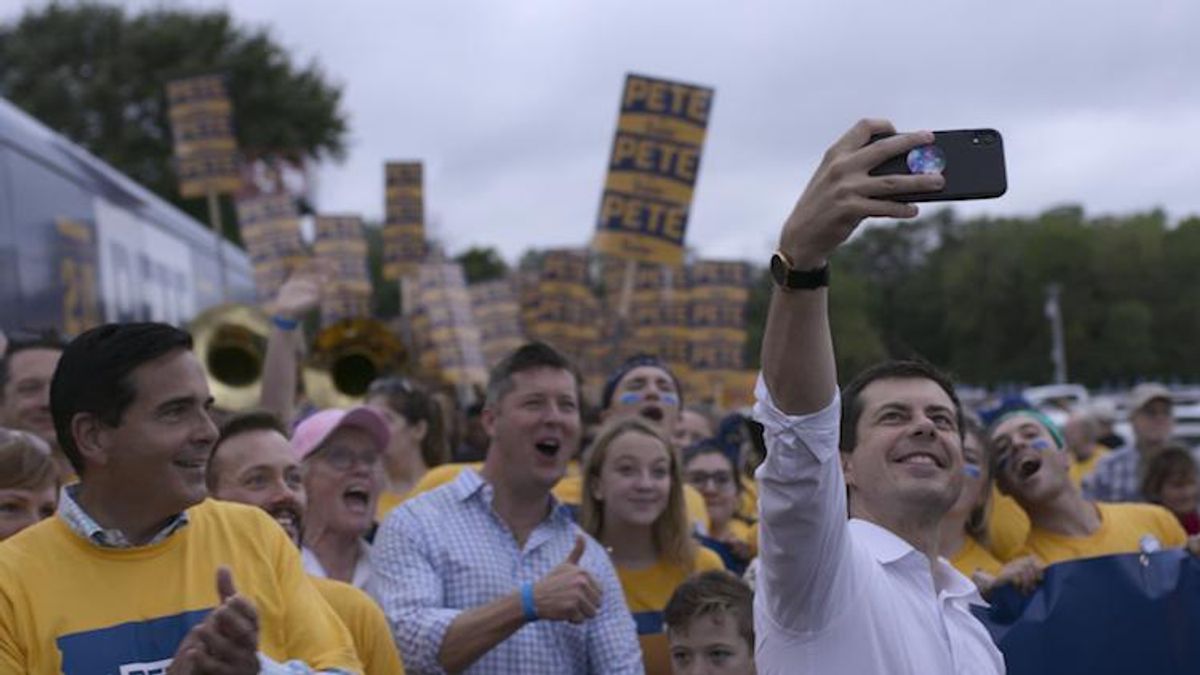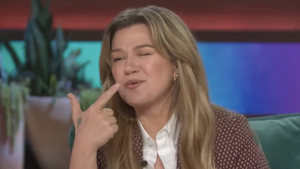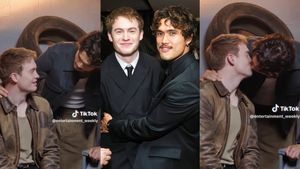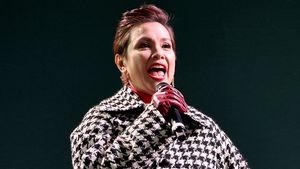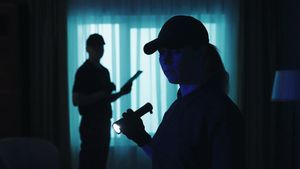When Jesse Moss began following Pete Buttigieg for a documentary on his campaign for the Democratic presidential nomination, Moss wasn't sure if the campaign would go very far or if he'd even get a film out of it. But there were many surprises in store.
"I was really surprised, but maybe I shouldn't have been, that his campaign took off," says Moss, the director of Mayor Pete, which has been screening at film festivals and starts streaming on Prime Video November 12.
"I knew Pete was an ascendant star in the Democratic Party even though he was just mayor of South Bend," Moss says, noting that Buttigieg had made an unsuccessful run for national party chair before launching his presidential bid. But the filmmaker wasn't prepared for how the gay Indiana mayor would resonate with voters.
"The message of the campaign of belonging, of building an idea of inclusivity based on personal experience, of all these things that Pete is, really did connect not just, frankly, with members of the LGBTQ community, who saw something inspiring in Pete's story, but in places like Iowa, with socially conservative Democrats who seemed to be open to supporting him and maybe were less interested in the fact that he was a gay man than what he'd done in South Bend," Moss says. "The fact that the campaign was catching fire was really exciting and interesting."
The documentary shows Buttigieg speaking to appreciative crowds around the nation, getting blunt feedback from campaign advisers, taking the national debate stage, sharing quiet moments with husband Chasten, and dealing with some challenges, such as meeting with Black residents of South Bend who were outraged about a white police officer's killing of a Black man.
Buttigieg is a multifaceted man, Moss observes. "I was compelled by a number of aspects of Pete," he says. "His youth, his unusual profile, the ways in which he cuts across different lines in American life -- a mayor of a Rust Belt city, a millennial, a gay man, a Rhodes Scholar, an Afghan War vet. I'm not sure they added up in a way that I had an obvious reference point for, but they seemed like an interesting set of personal characteristics."
But he's also rather reserved, and that posed a difficulty for Moss. "He's very articulate, but a bit remote ... I found that to be challenging in that he's extremely controlled. Of course, that is what a candidate needs to be to be successful, but often that makes for a bad documentary subject. The challenge, I think, was to understand 'Who is Pete Buttigieg?' and I think one key to unlocking that for me was Chasten."
Indeed, Chasten Buttigieg emerges as a costar of the film. "I met Chasten pretty soon after we got started, and Chasten is so different than Pete -- he's emotionally demonstrative," the director says. "I liked Chasten a lot, and I could understand Chasten in ways I couldn't understand Pete, and I thought, well, maybe I can see Pete from Chasten's point of view and that'll help me, and I can see this journey that they're on together from Chasten's point of view and that'll also help me.
"I sort of gravitated to Chasten more than I had planned to, and I suddenly recognized that to me, the relationship at the center of the story was as interesting as the political narrative -- two people going through this experience together, negotiating their identities privately and publicly, as gay men on the political stage and how they relate to each other -- that was just really unexpected and something I wanted to focus on as much as what was happening in Iowa and New Hampshire and debate preparation."
It turned out the personal and the political were related, Moss says, as he watched Pete Buttigieg struggle to be his authentic self on the campaign trail -- not only his authentic self as a gay man, but as someone whose reserved nature sometimes conflicts with the demands of running for office.
But Buttigieg did find a ready audience, going farther in his campaign than any previous out candidate. He did well in the first two contests of the election cycle, winning the most delegates in the Iowa caucus, although Sen. Bernie Sanders won the popular vote there, and finishing second to Sanders in the New Hampshire primary.
"Watching him become a top-tier candidate in this 20-person field was just like being on a rocket ship," Moss reflects, adding, "The fact that he was willing to continue to let me be in the room during this process, both at home and during debate preparation with his political advisers, surprised me."
In the end, Buttigieg was not the nominee; he dropped out after fourth-place finishes in Nevada and South Carolina, and threw his support to Joe Biden. But -- spoiler alert -- the film does have a happy ending, with Biden, once he was elected president, choosing Buttigieg for a cabinet position, secretary of the Department of Transportation.
Buttigieg has continued to make history since filming concluded, getting confirmed by the U.S. Senate for that position (the first out LGBTQ+ person to achieve that distinction), adopting twins, and promoting Biden's proposals on transportation and infrastructure. "I'm not surprised he has that role," Moss says of Buttigieg's work for the Biden administration. "He's good at it."
It's probably too early to tell what impact Buttigieg will have on future LGBTQ+ candidates, but Moss tends to think he'll inspire them. Moss is straight but considers himself "very much" an ally, and several of the documentaries he's directed or produced have dealt with LGBTQ+ issues.
The Overnighters, which he directed, centers on a minister assisting men who've come from afar to his North Dakota town in search of work in the oil industry, and in the course of the film the minister comes out as gay. The Family, a series he directed for Netflix, looks at the political influence of a secretive Christian right group, and of course one of the group's tenets is opposition to LGBTQ+ equality. Gay Chorus Deep South, on which he was a producer, tracks the San Francisco Gay Men's Chorus on a tour through the most conservative part of the nation.
Moss is tempted to take a break from political content, but nonetheless he is working on a couple more political films. "It seems like it's inescapable ... and I want to do work that matters," he says. "I'm still trying to figure out how we got to this moment and how we're going to find our way forward."
He hopes Mayor Pete will move that process along. "I think the film is a fascinating window into the reality of running for president and sort of what you go through as a human being in this almost inhuman process," he says. It's also a love story between Pete and Chasten, he adds, and "a story about our political moment and that idea of looking for belonging and something to move us past divisions that we feel so acutely in this country."
Mayor Pete is now available on Amazon's Prime Video.
